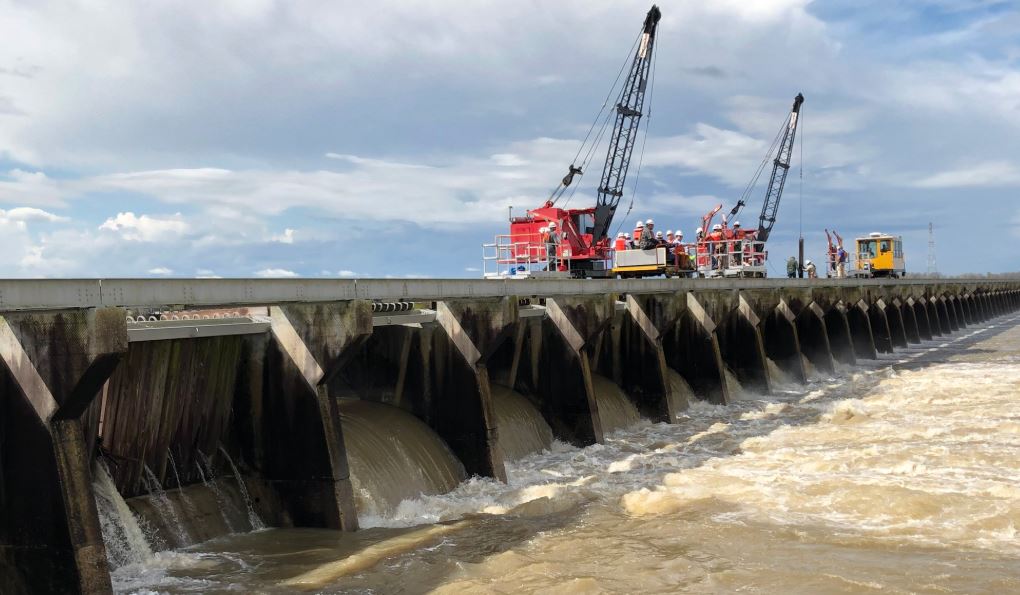Photo courtesy of U.S. Army Corps of Engineers
The Bonnet Carré Spillway in Louisiana is currently open in order to reduce pressure from the already flooded Mississippi River. In fact, for the first time in history, the Bonnet Carré has opened twice in one year. However, officials on Mississippi’s Gulf Coast are concerned with the millions of gallons of freshwater flowing into the Mississippi Sound, the effects could be disastrous for the state’s natural resources. Large numbers of dead dolphins and sea turtles have been reported, and scientists believe it may be due to a large amount of freshwater being deposited into the Gulf.
It has been 10 years since the Deepwater Horizon explosion, which caused a massive oil spill in the Gulf of Mexico. The ecological and economic impact from the oil spill was felt not only on Mississippi’s Gulf Coast but also throughout the state. Attorney General Jim Hood said while the oyster reefs are just beginning to be re-established, the opening of the spillway may cause additional harm.
General Hood wrote a letter to the Major General of the U.S. Army Corps of Engineers stating concerns regarding both the river flooding in the Delta and the environmental impact of the decision to re-open the Bonnet Carré.
The letter requests a meeting with General Richard Kaiser and his staff as soon as possible to better understand the situation and the Corps’ plan to protect Mississippians and the state’s natural resources in both the Coastal and Delta regions.
The letter also requested that Attorney General Hood be included in all future stakeholder meetings regarding the opening of the BCS and Mississippi flood management.
Hood said, “I reached out to the Corps of Engineers to better understand flood management and make sure the best approaches are implemented in protecting our communities from flooding and limiting serious environmental impacts. The opening of the Bonnet Carré Spillway on the Mississippi River by the Corps of Engineers has allowed freshwater and pollutants to flow through Lake Pontchartrain into the Mississippi Sound, killing dolphins and sea turtles and adversely impacting the seafood industry. Mississippi has one of the largest dolphin populations in the United States, and we have had increased dolphin deaths due to the freshwater displacing the salt content of the Sound. There have been 80 dolphin and 125 sea turtle deaths this year, and the month of April saw the highest number of these deaths in the past six years.”
Hood continued by saying, “I understand that the Corps is concerned about potential flooding in the New Orleans area. Meanwhile, our Delta farmers may not be able to plant a crop this summer, which will be devastating to Delta communities on top of extensive damage to homes. I want to make sure that the Corps is considering all of its options in flood management. Moreover, I want the federal government to know that the state of Mississippi intends to have its losses compensated or mitigated.”
Just in case you were interested, according to the U.S. Corps of Engineers – New Orleans District, the following provides more information regarding the operation of the spillway:
During operation of the spillway, materials suspended in the Mississippi River’s water are deposited in the floodway and Lake Pontchartrain and Lake Borgne. In addition, the vast input of fresh water into these brackish and saline lakes has an immediate, short-term, adverse environmental effect.
The long-range effect, however, is extremely favorable because it simulates the natural flooding cycle of the river and provides replenishment of valuable nutrients to the ecosystem. Spillway openings are strongly associated with increased oyster, crab and other fisheries production in Lake Pontchartrain and Lake Borgne for several years after the flood events.
With each opening, the river deposits an average of 9 million cubic yards of sediment, mostly silts and sand, within the floodway. These deposits are removed by private contractors and local government agencies for use as fill material in residential and industrial developments. This sediment is a valuable local resource since most of the surrounding region is near or below sea level.
In addition to the infrequent operation of the spillway for flood control, about every other year a small portion of the Mississippi River leaks through the spaces between the timbers of the spillway. This minor diversion of fresh water normally occurs for a few weeks in the spring or early summer when the river is high enough to exceed the elevations of the spillway weir but not high enough to warrant project operation. These minor diversions are termed leakage events (less than 10,000 cfs in comparison to a spillway opening with its design flow of 250,000 cfs).
The introduction of fresh water during leakage events simulates the natural cycle of overbank flooding and provides numerous ecosystem benefits to the aquatic and terrestrial resources in the spillway. These benefits include improved water circulation in the spillway’s water bodies, nutrient introduction and restocking of fishery resources. Recreational crawfishing, for example, increases significantly due to the optimal conditions produced by these events. These frequent, small-scale diversions of Mississippi River water are also beneficial to the Lake Pontchartrain estuary.
2019 – Spillway Timeline
After heavy rains in the Mississippi and Ohio River valleys increased river stages, the Corps opened the spillway on Feb. 27, 2019.
The Bonnet Carré Spillway will be partially opened on Wednesday, Feb. 27, 2019 in order to keep the volume of the Mississippi River flows at New Orleans from exceeding 1.25 million cubic feet per second (cfs). The river stages reminded high following the closure of the Bonnet Carré Spillway.
Heavy rains across the valley prompted a second opening of the spillway May 10.




